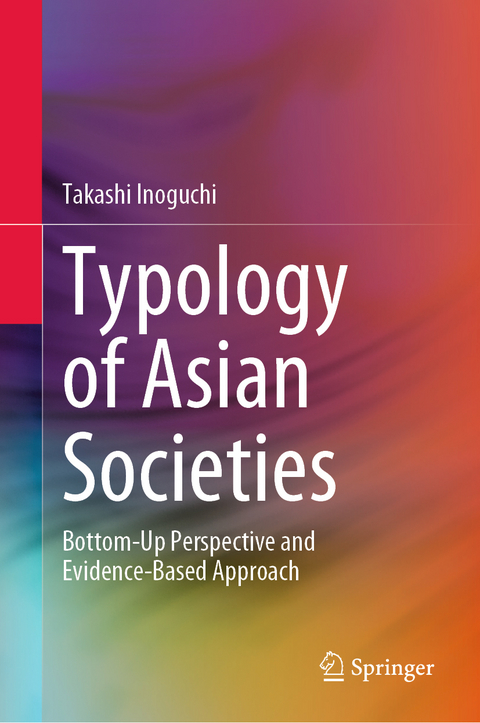
Typology of Asian Societies
Springer Verlag, Singapore
978-981-19-5465-8 (ISBN)
When random-sampled respondents are questioned about their satisfaction with daily life in terms of life domains, aspects, and styles, public policy and institutions as well as survival and social relations are inevitably touched upon—the latter two being the key dimensions common to the World Values Survey and other cultural surveys. This book proposesa new mode of typologizing societies, Asian or non-Asian, not immediately familiar to human geographers, cultural anthropologists, or sociologists, but revealing many complex unknowns with the easy-to-learn typologizing method.
Takashi Inoguchi is an award-winning prolific writer and educator on the topics of Japanese politics and foreign policy, East Asian international relations and Asian comparative politics, Dr. Inoguchi celebrates a career that has allowed him to impact his industry on the topics of quality of life in Asia, evidence-based typology of Asian society and transnationalism as manifested in the form of multilateral treaties through his publication of more than 150 books (of which 100 are in Japanese and 50 are in English). His recent authored and co-authored publications include “Exit, Voice and Loyalty in Asia: Individual Choice under 32 Asian Societal Umbrellas,” “Trust with Asian Characteristics: Interpersonal and Institutional,” “The Development of Global Legislative Politics: Rousseau and Locke Writ Global” and contributed an essay to “The Oxford Encyclopedia of Empirical International Relations Theory, Vol. 4.” Currently, Dr. Inoguchi finds success as the editor-in-chief of the AsianJournal of Comparative Politics, as the editor of The SAGE Handbook of Asian Foreign Policy 2 Vols., and as an eminent scholar-professor of political science at the Institute of Asian Cultures at J. F. Oberlin University in Tokyo, Japan. He is regarded within his industry for his previous work as a professor for the University of Tokyo, Senior Vice Rector of the United Nations University (assistant secretary general of the UN), chancellor and president of University Niigata Prefecture, professor of Chuo University, and associate professor at Sophia University. As an academic editor, he has been the founding editor of the Japanese Journal of Political Science, the International Relations of the Asia-Pacific, and the Asian Journal of Comparative Politics. As an academic editor of book series, he has been one of the co-editors along with G. John Ikenberry for “Asia Today”, the Editor-in-Chief for “Evidence-Based Approaches to Peace and Conflict Studies”, and the editor of “Trust: Interdisciplinary Perspectives.” In addition to his academic work, Dr. Inoguchi is recognized for his past involvement in projects that directly impact his industry. He was president of the Japan Association of International Relations, counselor for the International Trade and Investment Foundation, counselor for the International Economic Exchange Foundation, committee member for the U.S. Social Science Research Council, member of the Japan-United States Educational Commission, member of the Japanese Government Legislative Council, distinguished visiting professor for the National University of Singapore, visiting professor for the SciencesPo in Paris, and visiting professor for the Graduate Institute of International Studies in Geneva. For his incredible work, Dr. Inoguchi was the recipient of numerous grants from the Ministry of Education and he was honored as a Fulbright visiting scholar by the Center for International Affairs at Harvard University. Further, he earned an International Communication and Research Excellence Award, a Distinguished Research Fellow Award from the International Society for Quality of Life Studies. Dr. Inoguchi notes that the greatest honor of his life occurred twice: 1) when the International Society for the Quality of Life Studies established the “Takashi Inoguchi Endowed Track on Quality of Life and Well-Being in East Asia” award in his name, 2) when the World Association for Public Opinion Research conferred with “the Helen Dinerman Award” for his lifetime contributions to public opinion and public opinion research. A graduate of the University of Tokyo, he earned a Bachelor of Arts in 1966 and a Master of Arts in 1968. Thereafter, he attended the Massachusetts Institute of Technology, where he earned a PhD in 1974. To remain at the top of his field, Dr. Inoguchi is a member of the Science Council of Japan, the Japanese Association of International Relations, theAmerican Political Science Association, the International Political Science Association, the Japanese Political Science Association, the Japan Association of Public Policy Studies, the Asian Consortium for Political Research and the Japanese Society for Behaviormetrics. Looking to the future, Dr. Inoguchi intends to continue in his work while taking on new opportunities that come his way.
The Need for a Bottom-Up Perspective about Asian Societies.- The Need for an Evidence-Based Approach to Asian Societies.- Two Methodological Issues.- Attending Holistically and Analytically.- Are Asian Societies One Type.- Choosing Indicators and Typologizing of Societies.- Factor Analysis Results.- Twenty-Nine Types of Asian Societies.- Strength and Weakness of the Proposed Typology.- Corroborative Analysis and Empirical Validation.- Conclusion.
| Erscheinungsdatum | 23.11.2022 |
|---|---|
| Zusatzinfo | 25 Illustrations, black and white; XVII, 125 p. 25 illus. |
| Verlagsort | Singapore |
| Sprache | englisch |
| Maße | 155 x 235 mm |
| Themenwelt | Studium ► Querschnittsbereiche ► Prävention / Gesundheitsförderung |
| Sozialwissenschaften ► Soziologie | |
| ISBN-10 | 981-19-5465-8 / 9811954658 |
| ISBN-13 | 978-981-19-5465-8 / 9789811954658 |
| Zustand | Neuware |
| Haben Sie eine Frage zum Produkt? |
aus dem Bereich


